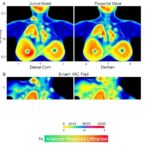
In a groundbreaking advancement poised to reshape prognostic assessments in oncology, researchers have underscored the transformative potential of the CALLY index—a combined marker integrating inflammation, nutritional status, and immune function—to predict outcomes in patients with digestive system cancers. This comprehensive systematic review and meta-analysis, published in BMC Cancer, consolidates evidence from a substantial patient cohort, revealing the CALLY index as an exceptionally powerful biomarker that could redefine pre-treatment risk stratification and clinical decision-making.
Digestive system cancers, encompassing malignancies of organs such as the esophagus, stomach, liver, pancreas, and colon, continue to represent a formidable challenge in global oncology due to their high incidence and mortality rates. Despite advancements in therapeutic modalities, prognostic uncertainties persist, complicating treatment strategies and patient counseling. Biomarkers that capture the complex interplay between inflammation, nutrition, and immunity are increasingly recognized for their capacity to refine prognosis predictions, yet the search for reliable, accessible, and integrative tools remains ongoing. The CALLY index emerges from this context, combining levels of C-reactive protein (CRP), albumin, and lymphocyte counts, effectively synthesizing critical biological domains linked to cancer progression.
The meta-analysis synthesized data from nineteen distinct studies involving nearly eight thousand patients, providing a robust statistical framework to evaluate the prognostic significance of the CALLY index across multiple survival endpoints. The researchers meticulously analyzed hazard ratios (HRs) for overall survival (OS), disease-free survival (DFS), recurrence-free survival (RFS), and cancer-specific survival (CSS). Each endpoint comprehensively reflects different facets of cancer prognosis—from general survival trends to relapse dynamics and mortality attributable directly to cancer.
One of the landmark findings was the consistent association between a lower CALLY index and poorer survival outcomes across all measured parameters. The pooled hazard ratio for overall survival nearly doubled for patients with a low CALLY score (HR = 1.973), highlighting a nearly twofold increased risk of mortality. Similarly, disease-free survival and recurrence-free survival exhibited significant adverse prognostic correlations with reduced CALLY index values. These robust associations were statistically significant, with p-values far below conventional thresholds, reinforcing the strength of the link.
Subgroup analyses further validated the clinical versatility and reliability of the CALLY index across heterogeneous patient populations and treatment modalities. Notably, the index retained strong predictive power regardless of the cancer subtype within the digestive system, treatment approach, threshold cutoff values used for classification, sample sizes, and even geographic variability. This level of consistency is paramount, suggesting the index’s potential universal applicability beyond localized cohorts or specific clinical settings.
Surgical patients, traditionally evaluated with a suite of clinical and pathological factors, demonstrated particularly pronounced predictive accuracy via the CALLY index. Here, the hazard ratio for overall survival was slightly above two, underpinning the possibility that preoperative evaluation of inflammatory and nutritional status provides invaluable prognostic insights. Such data could fundamentally enhance surgical candidacy decisions and postoperative management strategies.
Underlying the prognostic value of the CALLY index is its biological foundation. C-reactive protein is a well-established acute-phase reactant indicative of systemic inflammation, a hallmark of cancer progression and metastasis. Albumin reflects nutritional reserves and systemic health, which are critically linked to patient resilience and therapy tolerance. Lymphocyte counts serve as an immunological barometer, with depleted levels signifying impaired antitumor immunity. By combining these parameters, the CALLY index encapsulates a multidimensional snapshot of the host’s interaction with the cancer, integrating systemic inflammation, malnutrition, and immune competence.
This integrative approach advances beyond single biomarker assessments, addressing the complexity of tumor-host dynamics that drive disease trajectory. It aligns with the growing recognition in oncology that prognosis is not solely a function of tumor burden or molecular characteristics but is profoundly influenced by the patient’s systemic biological milieu. Consequently, the CALLY index represents both a paradigm shift and a practical tool, enabling clinicians to quantify this interplay effectively.
From a translational perspective, the cost-effectiveness and accessibility of the components—CRP, albumin, and lymphocyte counts routinely measured in clinical laboratories—position the CALLY index as a feasible addition to standard diagnostic workflows. Unlike expensive molecular assays or specialized imaging techniques, the index offers a scalable prognostic strategy suitable for diverse healthcare settings, including resource-limited environments.
The meta-analysis employed rigorous sensitivity analyses to ensure the robustness of their findings, mitigating concerns regarding study heterogeneity or publication bias. The minimal publication bias confirmed through statistical tests reinforces confidence in the reproducibility and generalizability of the conclusions drawn.
Clinical implications extend towards the potential integration of the CALLY index into multidisciplinary cancer care pathways. By identifying high-risk patients early, oncologists can tailor therapeutic regimens, prioritize nutritional and immunological interventions, and monitor inflammatory status more closely. This personalized approach could optimize both survival outcomes and quality of life.
Furthermore, the index may serve as a stratification factor in clinical trials, aiding in balanced cohort selection and more nuanced evaluation of investigational therapies. It also opens avenues for mechanistic research to explore the modulation of inflammation, nutrition, and immunity as therapeutic targets in digestive cancers.
As survival outcomes rely increasingly on individualized treatment paradigms, biomarkers such as the CALLY index promise to bridge gaps between laboratory science and bedside application. Their utility underscores a broader shift toward holistic patient assessment, recognizing that systemic biological context is as crucial as tumor-centric factors.
This study marks a significant milestone in oncological prognostication, advocating for the adoption of integrative indices over isolated markers. The evidence supports the wider clinical adoption of the CALLY index and underscores the imperative for further prospective studies and clinical trials to refine its predictive accuracy and therapeutic implications.
In summary, the CALLY index stands at the forefront of prognostic innovation, combining foundational biological insights with practical clinical application. Its demonstrated ability to predict survival outcomes in digestive system cancers reliably, consistently, and cost-effectively heralds a new era in cancer management—one that marries inflammation, nutrition, and immunity into a singular, actionable framework for improved patient care.
Subject of Research: Prognostic evaluation of the C-reactive protein-Albumin-Lymphocyte (CALLY) index in digestive system cancers
Article Title: Integrating inflammation, nutrition, and immunity: the CALLY index as a prognostic tool in digestive system cancers – a systematic review and meta-analysis
Article References:
Wu, B., Liu, J., Shao, C. et al. Integrating inflammation, nutrition, and immunity: the CALLY index as a prognostic tool in digestive system cancers – a systematic review and meta-analysis. BMC Cancer 25, 672 (2025). https://doi.org/10.1186/s12885-025-14074-3
Image Credits: Scienmag.com
DOI: https://doi.org/10.1186/s12885-025-14074-3
Tags: albumin as a cancer biomarkerC-reactive protein and cancerCALLY indexclinical decision-making in oncologyDigestive cancer prognosisimmune function in cancer outcomesinflammatory biomarkers in oncologylymphocyte counts in cancer prognosismeta-analysis of cancer biomarkersnutritional status and cancerprognostic tools for digestive cancersrisk stratification in oncology



